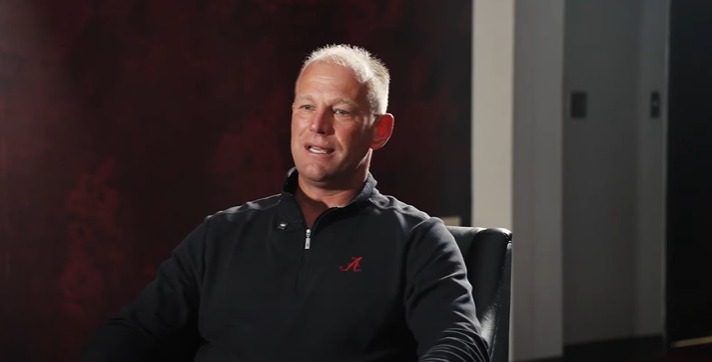Many people laud Coach Kalen DeBoer for creating outstanding programs, fostering a culture, and reinventing excellence on the football field. In his personal life, however, another fascinating story has been developing subtly and steadily; it is not based on playbooks but rather develops with each stage of development. His daughters, Alexis and Avery, are the owners of that tale; their ages are not only significant turning points but also indicators of how the family has changed in the eyes of the public.
Despite being incredibly young, Alexis DeBoer was poised when she made her NCAA debut in 2023 as a freshman for the Washington Huskies softball team. At the age of 17, she was making a name for herself rather than just following in her father’s footsteps. She had hit her first collegiate residence run by the beginning of 2025, displaying the athletic maturity that frequently takes years to develop. Avery, her younger sister, who is currently in sixth grade and about twelve years old, is still years away from the pressures of varsity. However, she has already shown signs of emotional depth by sharing touching posts like “Miss you, sis,” which capture a sibling bond bolstered by stadium lights.
| Attribute | Details |
| Full Name | Alexis DeBoer |
| Known As | Alexis |
| Date of Birth | Circa 2007–2008 (estimated based on high school graduation) |
| Age (as of 2025) | 17–18 years old |
| Current Education | University of Washington, Freshman |
| Sport | Softball |
| Team | Washington Huskies Softball |
| Position | Infielder |
| Father | Kalen DeBoer (Head Coach, Alabama Crimson Tide Football) |
| Mother | Nicole DeBoer |
| Siblings | Avery DeBoer |
| Reference | Kalen DeBoer – Wikipedia |
As careers are increasingly shaped by social media identity, early branding, and NIL deals in the NCAA today, Alexis is part of a generation of athletes who are redefining what it meant to be “college ready.” Despite being insignificant in terms of numbers, her age has symbolic significance. It puts her right in the middle of adolescence and early adulthood, allowing her to handle fan expectations and endorsement opportunities with maturity beyond her years.

The choice to remain in Seattle while her father took the head coaching position at Alabama is what gives her journey a special meaning. This geographical distance—her in the Pac-12, him in the SEC—adds a level of individual autonomy that is profoundly telling but rarely recognized. Similar to siblings in a successful family pursuing different careers, Alexis is demonstrating that legacy can sometimes flourish on independence rather than closeness.
Avery, meanwhile, has already received emotional attention despite being younger and not on the recruiting radar. She shared a heartfelt birthday remembrance of her father on social media during his 50th birthday in October 2024, giving fans a close-up look at the DeBoers’ family dynamic that they frequently overlook. These more subdued, unedited moments serve as a reminder that private strength continues to be essential to public life.
The scrutiny comes early and sticks like Velcro for athletes from legacy homes. Expectations frequently cast a shadow over the lives of the children of well-known coaches, such as Nick Saban, Dabo Swinney, or Lane Kiffin. But Alexis is not following those lines. She is claiming something unique by refusing to follow her father to Alabama: her name, her timeline, and her choices.
What’s even more fascinating is the way these stories spread. Alexis is not by herself. For instance, Bronny James is traversing comparable ground as he emerges from his father’s enormous footsteps to forge his own. Similarly, the tennis legacies of the Williams sisters were distinct yet connected. In addition to being flattering, these comparisons provide context by demonstrating how a person’s identity frequently changes in tandem with their family’s reputation.
Avery, on the other hand, continues to be in the background, protected, loved, and developing at her own speed. Avery, who isn’t yet quantified but is already valued for her honesty, works with handwritten notes and Instagram posts, whereas Alexis handles cameras and scoreboards.
It’s noteworthy how coaches’ kids, particularly their daughters, are becoming more visible. They are now included in the larger discussion and are no longer limited to background remarks or pregame shots. Interest is piqued in their personalities, goals, and even ages—not as gossip, but as indicators of changing social mores. Parents like the DeBoers are forced to be in the spotlight, but they still own the narrative they create for it.
